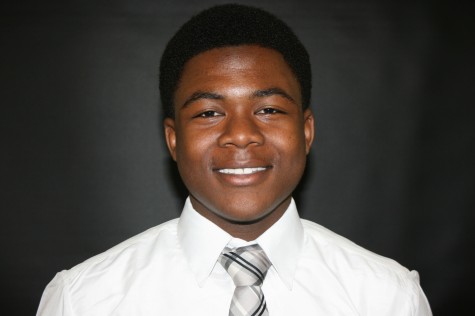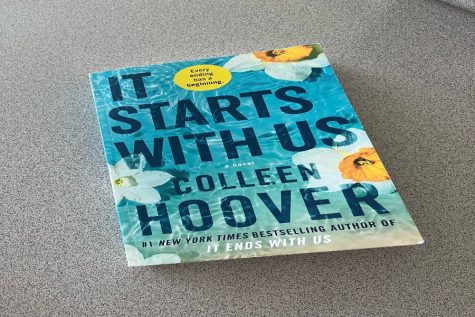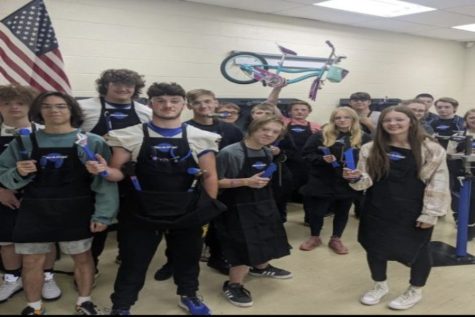Athletes can endure extreme heat, cold safely
IMAGE / Mr. Darrick Puffer
Makenzie Schroeder
With spring in full swing, rain and thunderstorms are unavoidable.
Constantly, sporting events are canceled due to the season’s weather.
But rain is not the only thing that changes sporting schedules.
Heat and the cold also can affect an athlete’s schedule and even their performance when they play.
Junior Liam Grathoff believes the weather can have an effect on him and his teammates during cross country and baseball season.
“When you get cold its tough. Your muscles tighten up and you’re not really loose. You have to stay warm,” Grathoff said. “In the summer, you sweat a lot and that also gets tough in the heat.”
In general, an athlete’s schedule is hectic. Among school, sporting events, practices, and appointments, it can be hard to find any time to do anything other than homework.
So when games are getting rescheduled, a student athlete’s schedule can be easily messed up.
When you get cold its tough. Your muscles tighten up and you’re not really loose. You have to stay warm.
— Liam Grathoff, junior
As a member of the tennis team, I know it can be stressful when my matches are canceled or rescheduled.
Sometimes the rescheduled matches conflict with plans I have, so I have to cancel them.
Other times when a match is canceled, it can be disappointing.
Not to mention coaches are not always the most understanding, so when athletes of all sports have to miss a rescheduled event, coaches sometimes get upset.
These rescheduled events can be understandably frustrating for everyone, even parents.
But on some days, it is honestly just too cold or hot to play outside.
According to the Michigan High School Athletic Association, when the heat index is above 104 degrees sports must stop all activity. The heat index is a combination of the temperature and the relative humidity.
In these cases, sporting events need to be rescheduled even if it is a huge hassle.
But when the heat index is above 104 degrees, is that the proper time to cancel sporting events?
Personally, I think once the heat index hits 95 degrees, practices and games should be canceled.
Having to do physical activity in the extreme heat isn’t safe.
You have a higher chance of becoming dehydrated, having a heat stroke, and even getting sun poisoning.
But MHSAA guidelines state that if the heat index is below 95 degrees water breaks must be allowed.
If the heat index is 95 to 99 degrees, athletes of all sports must be monitored and ample amounts of water must be provided along with iced-down towels.
Athletes should be able to drink as much water as needed with optional 10-minute water breaks every 30 minutes.
Coaches should reduce the time of outside activity, and even consider postponing practice until later in the day when the heat index decreases.
Coaches need to keep rechecking the temperature and humidity every 30 minutes to monitor for increased heat index.
If the heat index is 99 to 104 degrees, all of the regulations for lower temperatures are still in place with the addition of a few more.
Mandatory 10 minute-long water breaks every 30 minutes must be provided.
Uniforms may be altered by removing items if possible.
Coaches must allow athletes to change into dry clothes every so often, and the time of outside activity must be reduced as well as indoor activity if there is no proper air conditioning.
Practice may be postponed until later in the day.
We try to make sure we don’t do anything if the heat index is 104 and higher. At that point we’re pretty much not doing anything at all.
— Mr. Paul Gaudard, athletics director
Helmets and other equipment must be removed if athletes are not involved in contact or if it is not necessary for safety. If it is necessary for safety, activity must be suspended.
Mr. Paul Gaudard, athletics director, does everything possible to make sure these requirements are met during times of severe heat.
“We try to make sure we don’t do anything if the heat index is 104 and higher. At that point we’re pretty much not doing anything at all,” Gaudard said. “If it is in a 99- to 104-degree range, we are taking frequent breaks, making sure we have water. We’re doing a lot of things. If it’s below that we’re just monitoring it.”
When I was in cheerleading, I remember having practice outside in above 90-degree weather.
I would usually feel sick at these practices and some of my teammates would have to sit out for a while due to feeling sick and dizzy from the heat.
Thankfully, we got a lot of water breaks, but, all-in-all, those practices were horrible and felt hazardous.
I felt that all of the necessary MHSAA guidelines were not met that were supposed to be in place.
The water breaks were short, and there was no way to cool off.
I feel that the coaches just honestly did not know about all of the regulations and should be better informed.
On the other end of the weather spectrum, snow and the cold also affect things.
Typically, softball and baseball get canceled if the temperature is 38 degrees or lower due to the bats not being under warranty. The lower temperatures increase a bat’s chances of cracking.
Overall, there are no serious hazards of having a sporting event or practice in the cold, unless you are not wearing the proper clothing for the weather or are outside for hours and hours.
I would not like to play in super hot weather, but I would not like to play in super cold weather because it hurts when it is cold. But it is really exhausting and tiring when it’s hot.
— Kyle Alburtus, senior
It is just plain out annoying and miserable, not dangerous.
Senior Kyle Alburtus hopes that the weather is “perfect” on days of practice and games.
“I would like to play in the median,” Alburtus said. “I would not like to play in super hot weather, but I would not like to play in super cold weather because it hurts when it is cold. But it is really exhausting and tiring when it’s hot.”
Unfortunately, we live in Michigan and weather that is in the median is not that common.
Athletes and coaches do their best to make outdoor sports work with the wild weather that we Michiganders must endure.
“You have to play it by ear,” Gaudard said. “Put students’ safety first and go from there.”
My advice to students is to know your physical limits. Do not push yourself in times of extreme heat.
If you feel like you are getting sick, dizzy, nauseous, or light headed, take a break. Make sure you drink some water and relax for a while until you feel better.
Sports are a lot of fun to participate in, so let’s all make sure they are performed safely.

Class: Senior
Extracurricular Activities: National Honor Society, DECA
Sports: Varsity dance, varsity tennis
Hobbies/Interests: Reading, shopping,...

Class: Junior
Clubs: Keystone Club, Boys' & Girls' Club of Greater Flint
Athletics: Football, Track & Field
Hobbies: Volunteer work, Hanging...











